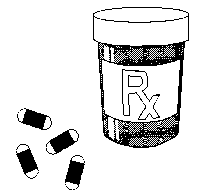 Vol. 4, No. 2, 1998 Page 2
Vol. 4, No. 2, 1998 Page 2 
 Vol. 4, No. 2, 1998 Page 2
Vol. 4, No. 2, 1998 Page 2 |

Ernest Barratt and colleagues report that the anticonvulsant drug phenytoin (Dilantin) treats impulsive aggression more effectively than non-impulsive aggression-a finding that adds to evidence suggesting that impulsive aggressive criminals differ biologically from those who commit premeditated aggressive acts.
 Barratt and colleagues note that "phenytoin has a long and controversial history as an
anti-aggression medication," with early studies reporting success and later studies reporting
"almost an even number of positive reports and negative results." To see if these contradictory
findings were due to differences in subjects, the researchers tested the drug on two groups of
aggressive convicts: 30 identified as committing primarily impulsive acts while imprisoned, and
30 who committed primarily premeditated acts (such as attacking members of other gangs).
Criminals with known medical disorders contributing to their aggression were excluded.
Barratt and colleagues note that "phenytoin has a long and controversial history as an
anti-aggression medication," with early studies reporting success and later studies reporting
"almost an even number of positive reports and negative results." To see if these contradictory
findings were due to differences in subjects, the researchers tested the drug on two groups of
aggressive convicts: 30 identified as committing primarily impulsive acts while imprisoned, and
30 who committed primarily premeditated acts (such as attacking members of other gangs).
Criminals with known medical disorders contributing to their aggression were excluded.
In the double-blind, crossover study, subjects received low doses of phenytoin or a placebo for six-week periods. According to the researchers, phenytoin reduced the frequency of aggressive acts in the impulsively aggressive group by 71 percent, and reduced the intensity of such acts by 60 percent. In contrast, the drug had little more effect than the placebo on non-impulsive aggressive subjects. In addition, the researchers say, "there was a trend for the serum levels of phenytoin to be inversely related to both frequency and intensity of aggressive acts" among impulsive aggressive subjects, but not among non-impulsive aggressive subjects.
The researchers also evaluated subjects' event-related potentials (ERPs), a measure of information processing in the cortex. "The amplitudes of P300 ERP waveforms among impulsive aggressive subjects were increased significantly during the phenytoin condition," they report, "but not during the placebo condition." No significant changes were seen in non-impulsive aggressive subjects.
In an earlier study, Barratt and colleagues administered neuropsychological tests to impulsive and non-impulsive aggressive subjects (most of whom also participated in the new study), and found that the impulsive aggressive subjects showed significantly reduced ability to decode verbal symbols, consistent with developmental dyslexia.
"It is highly probable that the reading deficits present in the impulsive aggressive inmates were there from the beginning of their school experiences," the researchers say. "The inability to easily discriminate visual information in social situations could have led to their being frustrated and to impulsive aggressive acts." In addition, they say, verbal skills deficits could make it difficult for these individuals to incorporate societal mores and laws into memory as guides to behavior.
Based on their new findings, the researchers suggest that low-dose phenytoin may be a useful tool in reducing impulsive aggression in prison inmates. Furthermore, they suggest that "to the extent that impulsive aggressive subjects have developmental dyslexia that relates to brain functioning as measured by atypical ERPS and to the extent that phenytoin changes the ERPs toward a more `normal' pattern, it is possible that the use of phenytoin may be a helpful adjunct in remedial reading among impulsive aggressive inmates."
"The effects of phenytoin on impulsive and premeditated aggression: a controlled study," Ernest S. Barratt, Matthew S. Stanford, Alan R. Felthous, and Thomas A. Kent, Journal of Clinical Psycho-pharmacology, Vol. 17, No. 5, Oct. 1997, pp. 341-349; and, "Neuropsychological and cognitive psychophysiological substrates of impulsive aggression," Ernest S. Barratt, Matthew S. Stanford, Thomas A. Kent, and Alan Felthous, Biological Psychiatry, Vol. 41, No. 10, May 15,1997, pp. 1045-1061. Address for both: Ernest Barratt, Dept. of Psychiatry and Behavioral Sciences, University of Texas Medical Branch, 301 University Blvd., Galveston, TX 77555-0443.
